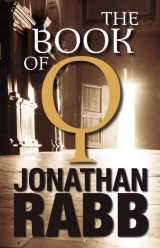
Текст книги "The Book of Q"
Автор книги: Jonathan Rabb
Жанр:
Триллеры
сообщить о нарушении
Текущая страница: 3 (всего у книги 28 страниц)
“I can’t imagine the Vatican-”
“Neither can I, but that’s not going to stop me from nodding and smiling, and giving them anything they want. How long have you been in this part of the world, that you don’t understand that?” The two men reached the helicopter; Mendravic turned to Pearse. “And I won’t bother asking what actually happened in that church last night.” He stepped back inside, his eyes now on Petra. “I’m also grateful that no one else was there.”
The helicopter lifted off, Pearse again watching as it disappeared into the sun.
Five hours later, he stood beside a small van. The driver, a man originally from Tirana, had slipped across the Albanian border a few months back and was now helping others to find their way through the perilous back roads of the upper Balkans. For a price, of course. Today, he would be escorting a young American as far as Zagreb. A journalist, he had been told. The details never really mattered. Naturally, he was splitting his take with a few well-placed guards-if, in fact, one could call the apes at the border “guards”-but it was still good money. Americans always overpaid.
“You pay double if we get to the border after sundown,” the man barked over the idling motor.
Pearse ignored him and continued to speak with Mendravic. “I have the address.”
“He’s a distant cousin,” said the Croat, “but he should know I’m still alive.”
Pearse nodded, tried a smile. “She won’t come out, will she?”
Mendravic started to answer, then grabbed him by the shoulders and pulled him close. “Whatever brought you here is still with you. Don’t ever question that.” He held Pearse for some time before releasing.
“I’ll try.”
Mendravic smiled, nodded. “No, she won’t.” He reached out and cupped Pearse’s cheek in his hand. “Good-bye, Ian.” With that, he turned and made his way into the house.
Pearse waited a moment, then opened the door of the van. He glanced one last time at the war-torn landscape, then ducked into the seat. His Albanian seemed overly anxious.
“I’m telling you, after sundown, we don’t get through. No matter how much money you have.” He waited for Pearse to say something. “You dohave the money, don’t you?” Pearse nodded. The man immediately ground the van into gear, yammering away as they pulled out. It was a poor act, but at least it was entertaining. Pearse hoped it would be enough to keep him preoccupied for a few hours.
He thought of looking back, but instead, he shut his eyes.
Better that way.
PATER
one
Rome,August 2000
The smell of incense hung in the air, strong and sweet within the confines of the church of San Clemente. A summer rain had caught most of the gathering unawares, dank heat compacted within the stone and marble walls, hats and hands turned to fans so as to combat the humidity. Even the mosaics above, ochered reds and greens, seemed to glisten in the heat. Usually left open, the nave was set with row after row of chairs directly behind the schola cantorum, the choir seats filled with boys in white robes. On occasion, a small hand slowly lifted to brush away a pool of perspiration; otherwise, the boys remained perfectly still as they listened to the Latin Mass for Monsignor Sebastiano Ruini. A voice rose from the altar in doleful Latin, its singular cadence lulling the crowd to sleep.
Father Ian Pearse sat on the left-hand side in the second-to-last row. He was using his program to fend off the heat, his thoughts on the multiple strands of sweat racing down his back.
Truth to tell, he hadn’t really known Ruini, had seen him only once or twice at the Vatican Library-a man fascinated with fourth-century architecture, on a three-month dig somewhere in Turkey up until a few weeks ago-enough of an acquaintance, though, to merit an appearance at his funeral. It was the same with most of the congregation, fellow clergy whose time in Rome was spent less with matters of faith than with scholarship. Each might have been hard-pressed to distinguish between the two, but theirs was a different kind of service to God, one without the desire to tend a flock. It had been the perfect place to come for a young priest restless in his small Boston parish.
But perhaps restless was the wrong word. Uneasy. Uncertain. The questions in Bosnia had never really gone away. How could they have? Petra had stopped writing a couple of months after he’d gotten back-he’d made his decision; she was making hers. All ties cut. It only made the numbness more acute. Mom and Dad had told him that he needed to go back for her, figure it all out. No ulterior motive this time. They just wanted him happy.
Instead, he’d gone down to South Bend, played the young alum, worked out with the team, put on the ten pounds he’d lost. Best shape of his life.
Still, that same emptiness.
So he’d called Jack and Andy. Little brother in need of help. Jack had been studying for orals; Andy had been three weeks into a Harvard philosophy Ph.D. They’d both dropped everything and met him out on the Cape. A week at the old summer house. Nights on the beach with more cases of beer than any of them cared to remember. And, of course, the mandatory midnight swim their last night together.
“This is fucking freezing, Padre.” It was Jack’s little joke. The Padres had been the one team to show any real interest in Pearse during college. Jack liked the irony. Less so the cold water. “You get on a plane and you find her. Trust me. Situation solved.” Jack had a way of spelling things out for you. Ever since his two younger brothers had eclipsed his more than respectable six-foot-even, Jack had asserted his primacy in other ways. The words trust mewere a favorite.
As ever, Pearse was trying to float on his back, his eyes locked on the stars. “Ladies and gentlemen, I give you the shriveled balls theory of resolution.”
Andy let out a laugh and immediately sucked in a mouthful of water. Blessed with an Adonis-like build-six foot four, 220 pounds-he didn’t have an ounce of athletic talent to go with it. He began to cough up water as he tried to stay afloat.
“You drowning on us, Lurch?” asked Pearse.
“I’ll let you know.”
“At least I’ve got some,” Jack piped in.
Pearse laughed. “And this from a man who’s getting a Ph.D.”
“Well, it is freezing.” Jack began to backstroke his way to shore. “You and Aquaman can figure it out. I’m going in.”
The sound of lapping water grew more distant as Pearse let his feet drop down, only his head now above water. He could just make out Andy about ten feet from him.
“You think I should go back?” he asked.
“Maybe.”
“The philosopher speaks.” Pearse waited. “No, what do you really think?” He heard Andy take a few strokes to his left.
“I think it would make your life a whole lot easier if it was only about her.”
“Meaning?”
“Meaning, if it was just her, you would have stayed.”
Pearse didn’t answer.
“So it’s not just about her,” said Andy. They floated silently for several minutes before he spoke again. “You should read Descartes.”
“What?”
“Descartes. Cogito ergo sum. You should read him.”
“Okay?”
“Except that’s not really it. It’s not the thinking that tells him he exists; it’s the doubting. Because if he’s doubting, then he must be thinking. So it’s dubito ergo sumthat leads him to cogito ergo sum.”
“How much did you have to drink?”
“You’re not listening, E. Look, I’m probably the closest thing we have to an atheist in this family, but even I know faith begins with doubt. If you don’t question it, what’s the point in having it? So things got a little rocked over there. That was the whole reason you went, wasn’t it? If you hadn’t come back a little disillusioned, then you’d have a problem. I might not get it, E, but I know you do. You always have. This is the first time something’s forced you to defend it. And that’s what’s making it so tough. Until you figure that out, she could be out here with us right now, and it wouldn’t make a damn bit of difference.” Pearse heard Andy duck his head underwater, then come back up. “One thing is for certain. It’s fucking freezing out here.” Andy started in for shore.
Pearse stayed out a few minutes longer, always happiest giving in to the isolation, his utter insignificance within a seemingly empty sea.
“Thanks, Andy.”
And, somehow, the ball began to fall into his glove again.
All through seminary, he had managed to hold on to that feeling. That connection. That sense of absolute wonder. A life of cloistered contentment. The surest way to keep Petra at a distance.
And, for a time, the questions faded, even the doubt that Andy had said was so essential. Pearse preferred it that way. Pure reflection. A proximity to God felt in the shadowed recesses of an afternoon prayer.
But only for a time. Once on the outside, he began to run into even greater confusion, especially in the role of priest: too much responsibility ceded by a willing congregation; too easy a reliance on detached hierarchy. Church dogma had a way of clouding everything. And what had been so pure, so personal at the seminary came to resemble that arm’s-length quality he had seen with his parents. Genuine connection no longer made sense. There was too much standing between believer and Christ to allow for it.
Not surprisingly, the emptiness from Bosnia slipped back in, threatening everything he had built for himself. He knew he needed to find another venue for his devotion, one more isolated, safer, where church structure couldn’t undermine his ever-tenuous belief. And where he wouldn’t allow Petra to find her way back in as a different kind of answer.
Walking alone one afternoon near Copley Square, it had suddenly dawned on him where he might find it. Or at least how. Everything had become a little too dark; he needed to lighten things up. So he’d gone back to the games, the fun of fragments and puzzles. This time, though, it wasn’t Paul, whose approach had always seemed colored by a Pharisaic past, nor the writers of the Gospels, each too caught up in his own agenda, but Augustine, where the insights remained acutely personal and therefore somehow less limiting-the fun and wonder reclaimed all at once.
And so, in an act of self-salvation, he’d dived in. He found himself consumed by it, simple translations leading to the more complex world of liturgical analysis. Somewhere along the way, he even began to make a name for himself-conferences beyond the walls of the church, papers beyond the scope of personal faith-a scholar of language, everyone so surprised, no one more so than himself. Except, of course, for John J. He’d known all along. The onetime Bosnian freedom fighter caught up in a world of minutiae, intricacies of meanings-energy focused on the subtleties of belief rather than on belief itself.
So much easier to “take it and read” than to take it and know.
He was, after all, his parents’ son.
Unwilling to admit that he was falling into that same trap, he’d pressed on, back to Ambrose, Augustine’s mentor, inspiration for the most brilliant mind the church had ever known. The most reasoned faith it had ever known. Find clarity in that wisdom.
So, when the opportunity to sift through a sixth-century palimpsest of the letters of Saint Ambrose at the Vatican had presented itself, he’d jumped at the chance. Not just for the scholarship but also for the place itself. Maybe in Rome he’d be able to reconnect with the purity he’d somehow lost along the way. The certainty.
It had been two years since then. Two years in which to find other projects so as to keep himself busy, keep him in Rome, insulated in a world of abstract piety. The answers might not have been any easier, but at least the questions were once again more distant.
The congregation rose, Pearse with them. Communion. He moved out to take his place in the line, when he noticed a familiar face some thirty feet ahead of him, the man looking back, trying to catch his attention. Dante Cesare, brother of the monastery at San Clemente-and an avid digger in the church’s storied foundations-stood by one of the half dozen vaulted archways that stretched the length of both sides of the nave. One of its few non-Irishmen, Cesare stood almost six foot five. And at no more than 180 pounds, he virtually disappeared into his robes, all thoughts of a torso lost, only scaly hands and feet protruding from the outfit. His equally elongated head bobbed above, aquiline nose stretching the skin taut around his cheekbones. An El Greco come to life.
They’d met just over a year ago in the Villa Doria Pamphili, a park just south of the Vatican, and the best place to find a pickup game on weekends. Pearse had gotten into the habit of taking a handful of kids from the American school out on Saturdays, play a couple of innings, keep himself in shape. Cesare had appeared from behind a tree one afternoon, keeping his distance, but clearly fascinated by it all. When a stray ball had rolled past him, he’d gone after it with the enthusiasm of a five-year-old. The image of those skeletal arms and legs thrashing around still brought a smile to Pearse’s face. It turned out that what the monk lacked in physical ability, he more than made up for in his understanding of the game. Cesare had been a rabid Yankee fan for years, knew all the statistics, the stories. The kids loved him. Pearse handled the drills; Cesare handled everything else.
Once a week, priest and monk, two topics off-limits: Thomas Aquinas’s thoughts on eternal law and Bucky Dent’s affinity for the Green Monster.
The relationship had blossomed.
The Cesare who now waited beneath the archway was hardly the man Pearse had come to know over the last year. The chiseled face looked even more gaunt than usual, not all that surprising, given how close he had been to the late monsignor. Still, Pearse saw more apprehension than grief in the eyes as the monk nodded to his left-an open area just beyond the archway, frescoes and mosaics adorning the high walls. Cesare moved off, Pearse behind him.
No one seemed to notice as the two men slipped away.
“We’re missing the best part,” whispered Pearse.
Cesare ignored him and continued to walk. He came to a large wrought-iron gate, a key already in hand, the stairs to the lower levels of the church beyond. Without any explanation, he slid the key into the lock and pulled it open, the sound of squealing hinges drowned out by the Mass going on behind them. Cesare quickly glanced over his shoulder as he hurried Pearse through, no time for any questions. He pulled the gate shut and locked it, then moved past him to the stairs.
Pearse had ventured down only once before with his friend. Then, it had been to see a small statuette Cesare had unearthed: a fertility relic from the second-century temple of Mithras some two or three levels below-he couldn’t quite remember which-one more piece in the ever-growing celebrity of San Clemente. Like so many of its counterparts around the city, the church boasted a healthy cache of archaeological finds dating back to the ancient Romans. Unlike any other, though, its lineage could be traced by descending from one floor to the next, from one church to the next-the twelfth century, the fourth, the second, each preserved in almost perfect condition. It was what made it so popular with the tourists. And why Pearse had always felt somewhat unnerved by the place. Too similar to another church. Another time.
Never quite relegated to the past.
Cesare had chosen an entrance reserved only for those involved with the excavations. He picked up a small lantern, turned it on, and handed it to Pearse; he then took one for himself and began to make his way down, still without a word. At the first landing, he again looked over his shoulder. Not knowing why, Pearse did the same; the stairwell was empty. The two continued down. Twice, Pearse tried to ask what they were doing, and twice, Cesare rebuffed him with a hand to the air.
After maneuvering their way through a series of circuitous tunnels-the sound of running water all around them-they finally arrived at the sixth-century catacombs, ragged stones hovering over narrow passageways. Cesare stopped and bent over as he turned into a small enclosure, its ceiling no more than five feet high. Pearse followed.
“This is the one,” said the Italian, his words clipped. He stood hunched over in a room perhaps seven feet wide, ten feet long, the texture of the walls reminding Pearse of late-summer sandcastles on a Cape Cod beach, wet sand dripping from above, each drop threatening to undermine the entire structure. Even now, he couldn’t be sure how long they both had before the brittle walls would come crumbling down.
“Another fertility god?” he asked with a smile, making it a point to stay by the doorway.
Cesare turned to him, his thoughts evidently elsewhere. “What?” A moment’s recognition, and then, “No, no, nothing like that. Why are you standing at the door? Come in closer. Quickly.” Pearse did as he was told and moved to the far wall.
“Never really understood that anyway,” he said, the smile broader. “A monk with a fertility god.”
“What?” Cesare asked distractedly. He was stooped over a small pile of rocks, busy pulling one off after another. Not waiting for an answer, he continued:“You knew Sebastiano was digging behind the Rapiza frescoes.” He stopped for a moment. “What am I saying? Of course you knew he was working in the old church. It’s where they found the body.” He was clearly agitated; he went back to work. “Well, I don’t think he was there two nights ago.”
The image of the forty-five-year-old Ruini, his corpse lying in the fourth-century church-captured forever in vivid black and white by one of the local papers-flashed through Pearse’s mind. “You don’t think he was where they found him,” Pearse echoed, his attempt at sarcasm meant to focus Cesare.
“Exactly. And I don’t think our friend’s heart simply gave out, as we’ve all been told.”
Pearse kept his eyes on the Italian, nervous, jaunty movements from a man well known for his composure. “I see,” he said, the ploy obviously having had no effect. “And why is that?”
Cesare stopped and looked back. “Can you help me with some of these?” He inched over so as to leave room for Pearse to kneel down next to him; again, Pearse did as he was told. Together, they removed the last few heavy stones. When they had uncovered a small hole in the wall, Cesare flattened himself on the floor and reached his arm into the crevice. A moment later, he pulled out a cylindrical metal tube; he then flipped over and sat against the wall; Pearse did the same. “Because,” he continued, “three nights ago, he gave me this.” He clutched the tube in his lap.
“Which is?”
“He was in an unbelievable state,” Cesare continued, as if not having heard the question. “I’d never seen him like that before. He told me to hold on to it, just for a few days, and to tell no one.” Cesare seemed to lose his train of thought. “He was distracted. Very distracted.”
“It seems to be catching,” said Pearse, trying to lighten the mood.
The comment momentarily brought Cesare back. “What?”
“Nothing. Did he tell you why he gave it to you?” he asked. When Cesare continued to stare blankly, Pearse added, “Have you looked inside?”
Cesare’s eyes went wild. “Why? Why do you ask that?”
Pearse raised his hands in mock surrender, another attempt to calm his friend. “I’m just asking. I didn’t mean to-”
“No, no, of course, you’re just asking.” Cesare placed a hand on Pearse’s knee, his expression at once benign. “I’m sorry. It’s just …” Again, he seemed to lose focus. He took in a deep breath, then slowly exhaled. Pearse waited until the monk was ready to speak again. “I took it, I put it in my rooms, and I didn’t think about it anymore. And then suddenly, he’s dead. Naturally I’ve looked inside.”
“And?”
Cesare turned the tube around until he found a small handle halfway down one side; he pulled up on the metal hasp and watched as the top of the canister hissed opened-the sound of a vacuum releasing. He gently took out what looked to be a scroll of rolled vellum. “He said it was something he’d found here, behind the frescoes.”
“And you have no idea what it is?” Pearse asked. Cesare shook his head quickly. “Do you know why he gave it to you?”
“To me?” It took a moment for the question to register. “No. He was frightened. We were both down here digging; he saw me … I don’t know. He said it would be just for a few days.”
Pearse nodded, more to reassure Cesare than himself. “So why did you bring the tube back here?”
The Italian let his head fall back against the stone. “Why … why did I bring it here?” Again, he needed a moment to collect himself. “Because the day after Sebastiano was … the day after he died, I went back to my rooms and discovered that someone had gone through the place.”
“What?” Pearse’s tone had lost all trace of humor.
“A few things were slightly out of place. I’m very particular about my things.” He nodded several times for emphasis. “Anyway, I knew someone had been there. Luckily, I have a space where I keep certain other things. They didn’t find it, whoever they were. But they were there. I know that. So to be safe, I brought the tube here.”
“Why not take it to the abbot, or the police?”
“You think I didn’t think of that? I was in a panic. When I realized what I should have done, they’d already decided to have the funeral here. All the preparations-it’s been impossible to sneak down without anyone seeing or asking. I couldn’t very well have gone to the abbot or the police without this,” he said, raising the scroll, then placing it back into the tube. He pulled down on the mechanism and sealed it.
“So why bring me?” It was the first time he’d thought to ask.
Cesare looked at him, his expression momentarily blank. He tried a weak smile. “I don’t know. I saw you. I thought it would be better to have someone with me.” He suddenly stopped, his gaze drifting to the floor. “Actually, that’s not entirely true.” Pearse waited for his friend to continue. “I knew you’d be here today.” Cesare kept his eyes on the ground. “I knew no one would take any notice of us during the administration of Communion.” He was clearly struggling with something.
Again, Pearse waited.
“Sebastiano said that the scroll … the writing …” Cesare looked up. “Well, it might have something to do with the Manichaeans.” When there was no response, he continued. “You’re familiar with the fourth-century heresies-Augustine’s response to Mani and his followers. I thought perhaps you’d know what to do with the scroll.” Now he paused. “And why someone might have been killed because of it.” The last thought forced Cesare to close his eyes, drop his head back against the wall.
“The Manichaeans?” The reference caught Pearse completely by surprise, its absurdity dispelling whatever apprehension he might have been feeling. “Dante”-he smiled, trying to find the appropriate words-“I’m hardly an expert, but I do know that no one would kill anyone because of what the Manichaeans had to say. That’s … ludicrous.” He couldn’t help a little laugh. “The sect died out over fifteen hundred years ago.” Pearse saw his effort to console coming to naught. “Look, if that’s what’s in the scroll, I can tell you, you have nothing to be worried about. Nothing. Maybe you misinterpreted what Sebastiano-”
“No.” The answer was tinged with anger. “I know what I saw. I know what he told me.” He turned to Pearse, no less adamant. “And I know who the Manichaeans are. Of course no one kills because of an ancient heresy. I’m not stupid, Ian.”
“I didn’t say-”
“Sebastiano thought there was something. I find it rather strange that he’s dead two days after he hands me a certain scroll, which, according to you, should give me nothingto worry about. My rooms are rummaged through. If you think it’s something funny-”
“All right.” Pearse was getting tired of sitting on the rock-hard floor. “We’ll take the scroll to the abbot, or the police, or whoever you think best. And we’ll see. How about that?”
Cesare waited before answering. “Fine.”
“Fine,” Pearse echoed. He rested his head against the wall. Sensing things were still a bit dicey, he added, “Then again, you might have reason to be worried.” He kept his eyes straight ahead. He waited for Cesare to turn to him. “The Sox did pull to within four games of the Yanks last night.”
It was several seconds before Cesare answered. “What?”
“The Sox. They’re within four. Might be time to be getting a little nervous.”
Cesare stared at Pearse. “What was the score?”
Pearse continued to gaze at the far wall. “They called it in the sixth. Ten-run rule.”
Cesare couldn’t hide the first hint of a smile. “I thought that was just for Little League?”
Pearse shrugged.
“Well, it’s as close as they’ll get,” said the monk.
Now Pearse smiled. He hoisted himself up, placed a hand on Cesare’s shoulder, and patted the weathered cloth. “Always the pessimist.”
“It’s just that you people never learn, that’s all.” For the first time in the last twenty minutes, he seemed to relax.
Cesare was just getting to his feet when the lights suddenly flicked on in the corridor. At once, panic, then a look of concentrated calculation fixed in his eyes. “The lights for the tourists,” he said as he moved to the door. “They can only be turned on from two floors above.” He scanned the corridor, then turned to Pearse, extending the tube to him. “It’ll take them a few minutes to get down here. Take this and put it back in the hole.”
“Dante, I’m sure-”
“Please, Ian, do as I ask. If this is nothing, you can laugh at me later. Just do this.” Pearse took the tube. “Put the stones back around it, keep your lantern off, and wait ten minutes before leaving. I’ll … try to distract them by going now. Meet me outside the Colosseum in an hour.”
Before Pearse could answer, the monk was through the door, the sound of his feet quickly receding down the corridor. Reluctantly, Pearse did as he was asked and turned off his lantern, the room at once pitch-black save for a tiny patch of light bleeding in through the doorway. The area by the stones, however, remained in complete darkness. He placed the lantern on the floor, then knelt so as to locate the hole. Feeling his way down the wall, he found the opening and slid the tube inside; then, one by one, he replaced the stones. He checked his watch: 4:40. Leaning his head back against the wall, he dropped his shoulders and closed his eyes.
The Manichaeans. Pearse couldn’t help but smile. Scourge of the true believers. Fifteen hundred years trapped in obscurity, and they were now forcing him to sit in a damp cave in the basement of a church waiting for the lights to go out. What could be more appropriate, he thought, from the “Brothers of the Light”?
Truth be told, even Augustine had been drawn in by the Manichaean mystique, a devoted member for a time, enticed by the sect’s response to the great question of the day: Whence comes evil? Pearse recalled how the subject had amounted to nothing less than a mania with the early Christians, all of whom had agreed, Not from a perfect God. But if not from God-source of all things-then from where? The Manichaeans, from the bits and pieces he remembered, had opted for a rather ingenious approach: the Persian dualism-the world torn between two combatant kingdoms of light and darkness, spirit and nature-forcing men to rely on reason to distinguish between the two. Suddenly, self-knowledge had held the key to salvation. Perhaps above even faith-a step the young Augustine had ultimately refused to take. How bitterly had he then turned on his onetime comrades, branded them heretics, forced them underground, a nascent sect destined for extinction. How vital it had been for him to stamp out the dangerous, if subtle, simplicity of their teaching.
And how dramatically, Pearse thought, had all that changed in the last fifteen hundred years. The Mass upstairs: still in the midst of Communion, now an everyday occurrence, no need to ponder its deeper meaning, the controversies long ago forgotten. No more battles to be won, no heresies to be put down, nothing that might provoke any real debate.
Faith at its most docile.
Shaking the more modern doubts from his mind, Pearse tried to concentrate on Cesare. As much as he wanted to dismiss the claim that Ruini’s death had been anything but natural, the intensity in the monk’s plea now forced him, if only for a moment, to consider the other, far more unsettling possibility. Even then, it didn’t make any sense. The newspapers had said heart failure. So, too, had the church. Why? To cover up a scroll? The Manichaeans? It was … absurd.
The sound of footsteps in the corridor brought his eyes open. Without thinking, he edged himself closer to the wall. It was an unnecessary precaution, as he sat shrouded in darkness, but the instinct to feel rock against his back won out over reason. He waited, certain that in a few moments a familiar face from the church above would peer through the doorway and ask him the embarrassing question: what exactly was he doing here? He tried to think of an answer as the steps drew closer, but there was something to them that stole his attention-too measured, too precise. Whoever was out there was coming slowly, as if looking for something.
Or someone.
For the first time since the strange jaunt had begun, Pearse felt uneasy. He pulled his knees into his chest and stared into the light coming from the corridor.
“He’s moving to the old church.” The sound of Italian echoed in the hall, the voice from a radio. “We have him.” All at once, a figure ran past the doorway, too fast for Pearse to catch any features. A man of average height. Dark hair. A raincoat. A few more seconds, and the sound of his steps faded to nothing.
Pearse didn’t move. The intrusion of the voice had been enough to jar him, but the words were what froze him to the ground.
We have him.
Anxiety became genuine fear, Cesare’s sense of urgency now his own as Pearse tried to conceive a logical explanation for the last half minute. But he couldn’t. The passionless voice over the radio coupled with the terror in the monk’s eyes discounted every choice but one. The old church.








